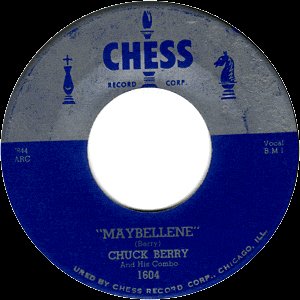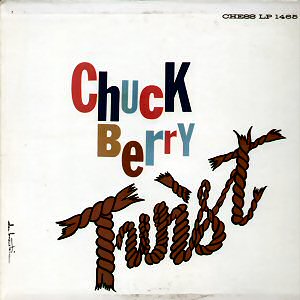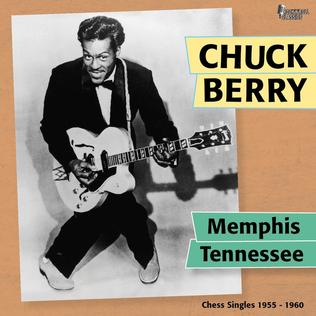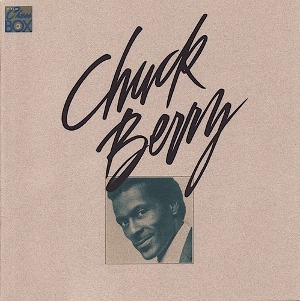Related Research Articles
Rock and roll is a genre of popular music that evolved in the United States during the late 1940s and early 1950s. It originated from African-American music such as jazz, rhythm and blues, boogie woogie, and gospel, as well as country music. While rock and roll's formative elements can be heard in blues records from the 1920s and in country records of the 1930s, the genre did not acquire its name until 1954.

Charles Edward Anderson Berry was an American singer, songwriter and guitarist who pioneered rock and roll. Nicknamed the "Father of Rock and Roll", he refined and developed rhythm and blues into the major elements that made rock and roll distinctive with songs such as "Maybellene" (1955), "Roll Over Beethoven" (1956), "Rock and Roll Music" (1957) and "Johnny B. Goode" (1958). Writing lyrics that focused on teen life and consumerism, and developing a music style that included guitar solos and showmanship, Berry was a major influence on subsequent rock music.

Rockabilly is one of the earliest styles of rock and roll music. It dates back to the early 1950s in the United States, especially the South. As a genre it blends the sound of Western musical styles such as country with that of rhythm and blues, leading to what is considered "classic" rock and roll. Some have also described it as a blend of bluegrass with rock and roll. The term "rockabilly" itself is a portmanteau of "rock" and "hillbilly", the latter a reference to the country music that contributed strongly to the style. Other important influences on rockabilly include western swing, boogie-woogie, jump blues, and electric blues.

Johnny Rivers is an American musician, singer, songwriter, and record producer. His repertoire includes pop, folk, blues, and old-time rock 'n' roll. Rivers charted during the 1960s and 1970s but remains best known for a string of hit singles between 1964 and 1968, among them "Memphis", "Mountain of Love", "The Seventh Son", "Secret Agent Man", "Poor Side of Town", "Baby I Need Your Lovin'", and "Summer Rain".

"Johnny B. Goode" is a 1958 rock song written and first recorded by Chuck Berry. Released as a single, it peaked at number two on Billboard magazine's Hot R&B Sides chart and number eight on its pre-Hot 100 chart.

William Patton Black Jr. was an American musician and bandleader who is noted as one of the pioneers of rock and roll. He was the bassist in Elvis Presley's early trio. Black later formed Bill Black's Combo.
The origins of rock and roll are complex. Rock and roll emerged as a defined musical style in the United States in the early to mid-1950s. It derived most directly from the rhythm and blues music of the 1940s, which itself developed from earlier blues, the beat-heavy jump blues, boogie woogie, up-tempo jazz, and swing music. It was also influenced by gospel, country and western, and traditional folk music. Rock and roll in turn provided the main basis for the music that, since the mid-1960s, has been generally known simply as rock music.

"Back in the U.S.A." is a song written by Chuck Berry that was released in 1959 and was a top 40 hit. A cover version in 1978 by Linda Ronstadt was also a hit.

"Roll Over Beethoven" is a 1956 hit song written by Chuck Berry, originally released on Chess Records single, with "Drifting Heart" as the B-side. The lyrics of the song mention rock and roll and the desire for rhythm and blues to replace classical music. The title of the song is an imperative directed at the composer Ludwig van Beethoven to roll over out of the way and make room for the rock and roll music that Berry was promoting. The song has been covered by many other artists, including the Beatles and the Electric Light Orchestra. Rolling Stone magazine ranked it number 97 on its list of the "500 Greatest Songs of All Time".

"Maybellene" is a rock and roll song. It was written and recorded in 1955 by Chuck Berry, adapted in part from the Western swing fiddle tune "Ida Red". Berry's song told the story of a hot rod race and a broken romance, the lyrics describing a man driving a V8 Ford and chasing his unfaithful girlfriend in her Cadillac Coupe DeVille. It was released in July 1955 as a single by Chess Records, of Chicago, Illinois. Berry's first hit, "Maybellene" is considered a pioneering rock and roll song. Rolling Stone magazine wrote of it, "Rock & roll guitar starts here." The record was an early instance of the complete rock and roll package: youthful subject matter; a small, guitar-driven combo; clear diction; and an atmosphere of unrelenting excitement.

After School Session is the debut studio album by rock and roll artist Chuck Berry, released in May 1957 by Chess Records. With the exception of two tracks, "Roly Poly" and "Berry Pickin'", all selections had been previously released on 45 rpm singles. It is the second long-playing album released by the Chess label.

Chuck Berry Twist is the first compilation album by Chuck Berry, released by Chess Records in February 1962, during Berry's imprisonment. The title was an attempt to capitalize on a new dance craze, the Twist, introduced by Chubby Checker in 1960, even though none of the songs musically conformed to the Twist style. The album was reissued a year later with a new title, More Chuck Berry. An album with that title was released in the UK by Pye International Records in 1964, featuring the same cover but a completely different track listing.
"School Days" is a rock-and-roll song written and recorded by Chuck Berry and released by Chess Records as a single in March 1957 and on the LP After School Session two months later. It is one of his best-known songs and is often considered a rock-and-roll anthem.
"Saturday Night Fish Fry" is a jump blues song written by Louis Jordan and Ellis Lawrence Walsh, best known through the version recorded by Louis Jordan and His Tympany Five.

"Kaw-Liga" is a country music song written by Hank Williams and Fred Rose.

"Memphis, Tennessee", sometimes shortened to "Memphis", is a song by Chuck Berry, first released in 1959. In the UK, the song charted at number 6 in 1963; at the same time Decca Records issued a cover version in the UK by Dave Berry and the Cruisers, which also became a UK Top 20 hit single. Johnny Rivers's version of the song was a number two US hit in 1964.

Chuck Berry's Golden Decade is a compilation of music by Chuck Berry, released in three volumes in 1967, 1973, and 1974. Covering the decade from 1955 to 1964, each volume consists of a two-LP set of 24 songs recorded by Berry. The first volume reached number 72 on Billboard's Pop Albums chart. The second volume peaked at number 110. The third volume, which included only two hit singles among its tracks, did not chart.

The Chess Box is a compact disc box set compilation by Chuck Berry. It is one in a series of box sets issued by MCA/Chess in the late 1980s. The Chuck Berry set is the most prominent of these, having won a Grammy Award for Best Historical Album in 1989. Berry's Chess Box was reissued on vinyl in 1990.
This article includes an overview of the major events and trends in popular music in the 1950s.
Robert L. Comstock was an American rock and roll and pop singer and musician who had success in the late 1950s and early 1960s both as a solo singer and as a member of Bobby Comstock and the Counts. His biggest hits were a version of "Tennessee Waltz" in 1959, and "Let's Stomp" in 1963.
References
- ↑ "The Chuck Berry Database: Details For Recording Session: 9. 1955". A Collector's Guide to the Music of Chuck Berry. Dietmar Rudolph. Retrieved 28 September 2021.
- ↑ Billboard - 29 Oct. 1955 new disks on the national chart are Chuck Berry's "Thirty Days" on Chess and Dinah Washington's "I Concentrate on You" on Mercury."
- ↑ Howard A. DeWitt Chuck Berry, rock 'n' roll music 1985 - - Page 14 "The sound of the country pedal steel guitar was transformed into rock-and-roll on Chuck Berry's electric guitar. ... When Chuck wrote 30 Days to pay tribute to Hank Williams' country music, he unwittingly acknowledged his debt to country ..."
- ↑ "Thirty Days (To Come Back Home) by Chuck Berry and His Combo: Versions". secondhandsongs.com. Retrieved 17 April 2016.
- ↑ "CHUM Charts - July 6, 1959".